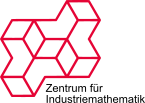Dr. Pascal Fernsel
Wissenschaftlicher Mitarbeiter der AG Technomathematik, Research Training Group π3Information: Email endet auf @uni-bremen.de
Forschungsgebiete
- Matrixfaktorisierungen für maschinelles Lernen
- Clustering
- Inverse Probleme
- Imaging mass spectrometry
Projekte
- Nicht-negative Matrix-Faktorisierung mit A-priori-Wissen (seit 01.12.2014)
Veranstaltungen (Auswahl)
- Mathematical Parameter Identification (RTG-Seminar) (Sommersemester 2025)
- Advanced Topics in Image Processing – The Beauty of Variational Calculus (Wintersemester 2024/2025)
- Inverse Problems in Imaging (Wintersemester 2023/2024)
- Deep Learning for Inverse Problems (Sommersemester 2023)
- Nonlinear Inverse Problems (Sommersemester 2023)
Abschlussarbeiten (Auswahl)
- Hauptkomponentenanalyse zur Untersuchung seismologischer Daten der Neumayer-Station III (Ribana Werner)
Publikationen (Auswahl)
- J. Gödeke, P. Fernsel.
New universal operator approximation theorem for encoder-decoder architectures (Preprint).
Zur Veröffentlichung eingereicht.online unter: https://arxiv.org/abs/2503.24092
- P. Fernsel, Z. Kereta, A. Denker.
Convergence Properties of Score-Based Models using Graduated Optimisation for Linear Inverse Problems.
2024 IEEE 34th International Workshop on Machine Learning for Signal Processing (MLSP), 22.09.-25.09.2024, London, Großbritannien.
IEEE, S. 1-6, 2024. - S. Arridge, P. Fernsel, A. Hauptmann.
Joint Reconstruction and Low-Rank Decomposition for Dynamic Inverse Problems.
Inverse Problems and Imaging, 16(3):483-523, 2022.DOI: 10.3934/ipi.2021059
- P. Fernsel.
Nonnegative Matrix Factorization: Theory, Algorithms and Applications.
Dissertationsschrift, Universität Bremen, 2022.DOI: 10.26092/elib/1493
online unter: https://doi.org/10.26092/elib/1493 - P. Fernsel.
Spatially Coherent Clustering Based on Orthogonal Nonnegative Matrix Factorization.
MDPI Journal of Imaging, 7(10), 2021.DOI: 10.3390/jimaging7100194
online unter: https://www.mdpi.com/2313-433X/7/10/194


